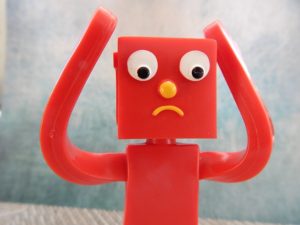
We all get there. It’s that moment in our parenting when, despite all of the books that we’ve read and all the sage advice our friends and family provide, we just can’t figure out WHAT TO DO.
I was talking with a mom the other day about her somewhat difficult relationship with her 7th grade daughter. She (the daughter) was testing mom a lot with provocative statements like “You don’t understand me because all you do is think about yourself.” The mom was understandably unnerved by this and had gotten into a pattern of responding with statements like, “Why do you have to be so negative all the time?” This made her daughter shut down in silence and the mom (likely her daughter too) was left feeling bad about the exchanges but at a loss for how else to handle them. The mom said to me, “I just feel broken inside when it comes to helping her with this. I know there’s something else I should be doing but I don’t know what it is.”
We began talking about the mom’s own childhood and she told me that around this same age her parents had gotten divorced. She described her own mother’s struggle during this time and how her mom had been preoccupied with the divorce and all the changes it created for them. I then asked her if her mom was available to help her with her developing identity and middle school issues and she said, “No, she was totally sidelined by the divorce.” I then told her that it made sense, then, that she was feeling lost at this particular juncture with her own child. Her mom had been attentive and present for her up until that point in her development but then was suddenly gone—engulfed in the vortex of her own tragedy. That was the point in her development where this mom lost her source of support and parental modeling. She got through middle school okay and after several years of hard times, her mother got back on solid ground and became more present again. But that childhood experience left a gap in her parent-training that was tripping her up now with her own daughter.
I told this mom that without childhood modeling from her own mother, she couldn’t be expected to intuitively know what to do to help her struggling daughter in her middle school years. I also validated that these were the hardest parenting moments—the moments when we come face to face with the gaps in our parent training—when we all feel lost and broken. This was a relief to this mom, who came to understand that she wasn’t actually broken—she was simply missing some skills because of lack of experience. With this awareness, she was able to release her guilt and confusion and go to work on developing the skills to parent her middle school child in a balanced and attuned way.
If you’re feeling broken, do a few things. First, be kind to yourself. We all occupy that space from time to time—when we’re lost as parents. Then, think about whether you were equipped by your parents’ modeling to have the skills to handle your particular situation. If you weren’t and you’re feeling lost, talk to friends and other supportive people in your life who have kids and find out what they do in similar circumstances. Lastly, talk it over with your child. It’s okay to admit that you don’t have all the answers all the time. It’s good modeling for your kids to show them that you too get lost and feel broken at times, but you then go to work to figure out how to get the answers you need to do the best job that you can.
Dr. Christine Carter, author of Raising Happiness and The Sweet Spot has a great article this month on self-forgiveness––something we can all practice when we’re feeling lost. Check it out here http://www.christinecarter.com/community/blog/2016/01/happiness-tip-go-easy-on-yourself/
My very best to you and your family,
Noah
For more information on today’s topic, including suggestions and examples, see my new book Better Behavior: Helping Kids Create Change and Improve Relationships. Available in both print and eBook at: Amazon, Kindle, Barnes & Noble, iBooks, Nook, and Kobo.
Information in this article is for educational and informational purposes only and does not constitute professional advice for any specific medical or psychological condition.